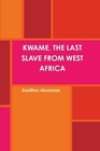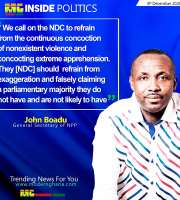

Business/Finance
- Business/Finance
- Economy/Investm..
- Macroeconomic Bul...
- Oil and Gas
- Commodity News
- Business Features
- MORE CATEGORIES
Market Info
Relevant Links
Media Links
KWAME, THE LAST SLAVE FROM AFRICA |
|

|
Author: Geoffrey Kofi Akuamoa ISBN: 978-14477-8234-6 Pages: 223 Price: 39.00 ghc Subject: humanities Availability lulu.com
|
| Description | |
| History of pre-colonial period of Ghana and the slave trade is not completely known in details due to lack of archaeological evidences and neglects. Storytelling is often by improvisation or aggrandizement, lacked amongst African ancestors. The stories written here are oral and there is no evidence of documents unlike the Dead Sea Scrolls. The goal was to retrieve the slave trade from some historical neglects and the loss of memory, and reinstate it to its rightful place at the forefront of modern history and current issues. This book is to honour the 54th anniversary of Ghana’s independence. This work is geared to recognize and scrutinise the many issues and effects that the trade brought to the West Africa and to search for ways and means to make this information relevant and widely known in our generation. People think they know, but many don’t. This book provides the reader with basic understanding of The Trans-Atlantic Slave trade from especially Ghana, West Africa, and the background of the nation Ghana, tribal wars and the role played by the chiefs and kings during the slave trade. Possessing a slave was seen as a symbol of wealth, supremacy and high prestige for the whites. The trade had detrimental effect on long-term economic growth and development as well as political stability and psychological effects it caused ethnic fractionalization. The young generations of modern Ghana are aware that there are twists and turns in every human life irrespective of legacy, something that is handed down from ancient Ghana, and which has to be fixed. The Trans-Atlantic Slave Trade begun from 1450 to 1874, 424 years. Progress, growth and expansion of free enterprise, inventiveness and mechanization were obstructed by the slave trade and limited prevailing industrial activities and incentives. Africans had complexity after the Slave Trade and had since been the Greatest World`s Problem. Although not many whites have aversion, people who have lived long enough are xenophobic, part of being white. Europeans found out that Africa was a market and a source of raw goods thus; West Africa was defined in terms of economic goods. The British engaged numerous arrangements of governance. Uninformed, uneducated and illiterates African and chiefs were misled into signing over their sovereignty to the British. Then, development of nationalism emerged. By the 1930s, West Africa had small elite of leaders familiar with ideas of governing to lead the struggle for independence. Recovery from the transatlantic slave trade for the Africans has been difficult due to many reasons mentioned in this book. |
|
Top Stories



 We’ll no longer tolerate your empty, unwarranted attacks – TUC blasts Prof Adei
We’ll no longer tolerate your empty, unwarranted attacks – TUC blasts Prof Adei
 Bawumia donates GHc200,000 to support Madina fire victims
Bawumia donates GHc200,000 to support Madina fire victims
 IMF to disburse US$360million third tranche to Ghana without creditors MoU
IMF to disburse US$360million third tranche to Ghana without creditors MoU
 Truck owner share insights into train collision incident
Truck owner share insights into train collision incident
 Paramount chief of Bassare Traditional Area passes on
Paramount chief of Bassare Traditional Area passes on
 Two teachers in court over alleged illegal possession of BECE papers
Two teachers in court over alleged illegal possession of BECE papers
 Sunyani: Victim allegedly shot by traditional warriors appeals for justice
Sunyani: Victim allegedly shot by traditional warriors appeals for justice
 Mahama vows to scrap teacher licensure exams, review Free SHS policy
Mahama vows to scrap teacher licensure exams, review Free SHS policy
 Government will replace burnt Madina shops with a new three-story, 120-store fac...
Government will replace burnt Madina shops with a new three-story, 120-store fac...
